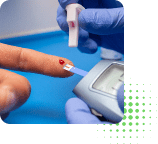![]()
Medical Nutrition Therapy
What
Who
How
Procedure
Benifits
When
FAQ

What Is The Medical Nutrition Therapy?
Medical Nutrition Therapy (MNT) is a way to manage chronic health conditions, primarily through weight loss or weight maintenance. This therapeutic approach to health can help you reduce symptoms of specific requirements and prevent further health complications by following a personalized diet and meal plan.
Who Should Seek Medical Nutrition Therapy?
Medical Nutrition Therapy aims to manage certain chronic conditions through an individualized nutrition plan. MNT is also called nutritional counseling. Your RDN will work with you to create a nutrition plan that meets your dietary needs while giving you feedback.
While many people may feel nervous or reluctant about starting a new diet or meal plan, your dietician will provide you with the tools to manage your chronic condition through dietary changes.
Your doctor may suggest nutritional therapy if you have one of these conditions:

Diabetes

Heart Disease

Renal Disease

Obesity

Gastrointestinal Disorders

Osteoporosis

Cancer

History Of Heart Attack
How Does Medical Nutrition Therapy Work?
It would help if you had a referral from your primary care doctor to start Medical Nutrition Therapy. Many MNT services are covered by insurance, including Medicare. Your insurance coverage will determine the number of sessions available to you.
You will begin by working with a Registered Dietician Nutritionist. Your RDN will help you create realistic goals to improve your health through nutrition.
They will:
-
Look at your current eating habits and lifestyle. -
Give you an in-depth assessment of your nutritional status. -
Work with you to develop a personalized nutrition treatment plan.
The procedure of Medical Nutrition Therapy
Your initial appointment with an RDN will take about an hour. The RDN will ask you about your diet and lifestyle during this time. They will ask about your MNT goals and medical history using this information. Together, you decide what outcomes you’re looking for while creating a personalized plan.Your RDN will likely ask you to start a food journal so you can reflect on your diet and habits. This can help your dietician decide where to change or improve your plan.
During follow-up visits, your dietician will provide tools to help you through Medical Nutritional Therapy. They will teach you to make better food choices and track your progress.

What Are the Benefits of Medical Nutrition Therapy?
There are lots of benefits of nutrition therapy. In addition to helping you manage your chronic condition, MNT can help prevent future health issues. Since you’re getting the help of an RDN, they can customize a diet plan for you that can help lower the risk of diseases like heart disease, obesity, and diabetic neuropathy. While weight loss is often the goal, the benefits of weight loss include increased levels of energy and healthier habits. You’ll notice that when you work with an RDN, you will most likely start to:

-
Increase your physical activity -
Make healthier choices -
Read food labels -
Reduce the amount of fried or processed foods you eat -
Drink more water instead of sugary drinks -
The habits you pick up while practicing Medical Nutritional Therapy can improve your overall health now and into the future.
When should MNT be implemented?
MNT is prescribed after an in-depth evaluation by an RDN determines that you have a medical condition that can be improved by adhering to this method.
As such, MNT isn’t always necessary. For example, someone admitted to the hospital for a procedure determined to eat well, adequately nourished, and not at risk of malnutrition may not require MNT.
Generally, a doctor orders a nutritional assessment from an RDN when a patient is admitted to the hospital. An RDN may be consulted in an outpatient setting if a doctor suspects a nutrition-related concern.
Frequently Asked Questions
1. What is Medical Nutrition therapy?Medical nutrition therapy (MNT) is crucial to many disease management. MNT is a “nutrition-based treatment provided by a registered dietitian nutritionist.” It includes “a nutrition diagnosis and therapy and counseling services to help manage diabetes.”
2. Why is medical nutrition therapy important?
MNT is a well-established nutritional approach to alleviating, managing, and treating certain medical conditions. It has been proven effective for many common chronic illnesses like heart disease, diabetes, cancer, kidney disease, and digestive disorders.
3. Is the primary goal of medical nutrition therapy? Dietary therapy aims to optimize body weight with appropriate protein and carbohydrate levels, fat restriction, and calorie and portion control.
4. What is an example of medical nutrition therapy? It includes checking a person’s nutrition status and giving the right foods or nutrients to treat conditions such as those caused by diabetes, heart disease, and cancer. It may involve simple changes in a person’s diet or intravenous or tube feeding.
[elementor-template id=”245″]